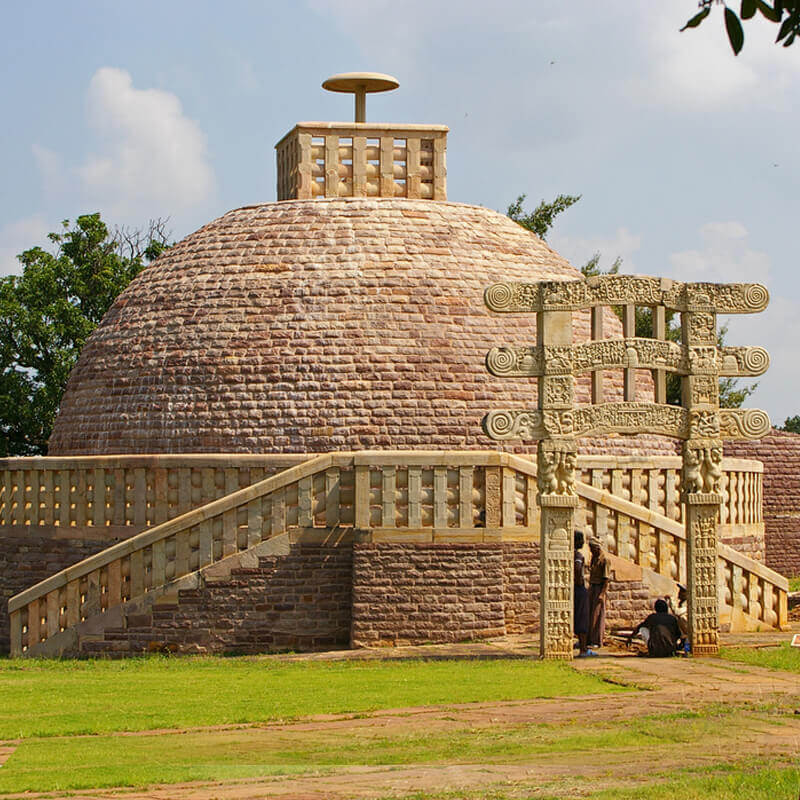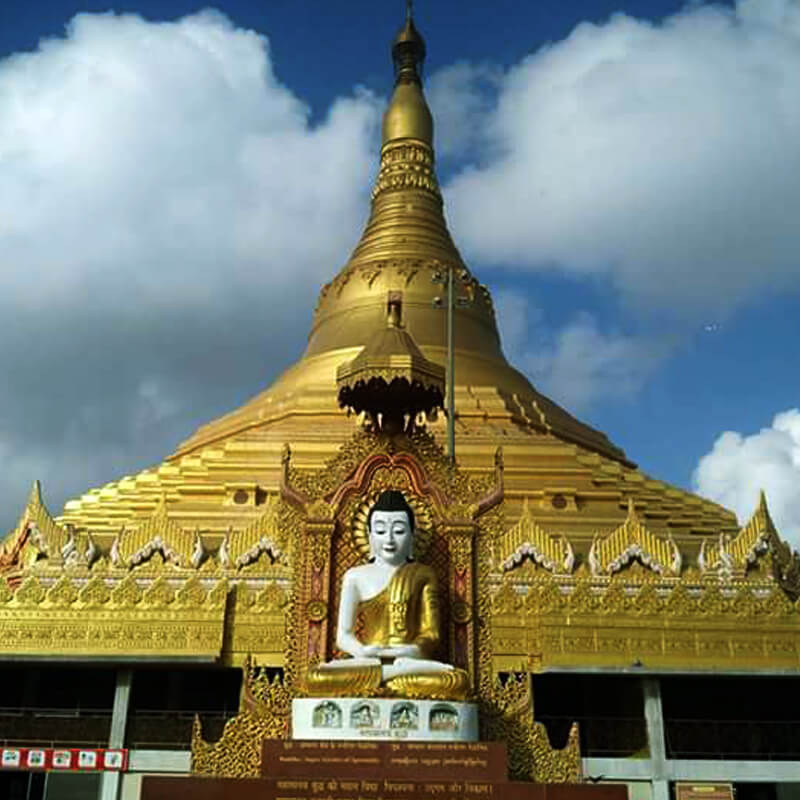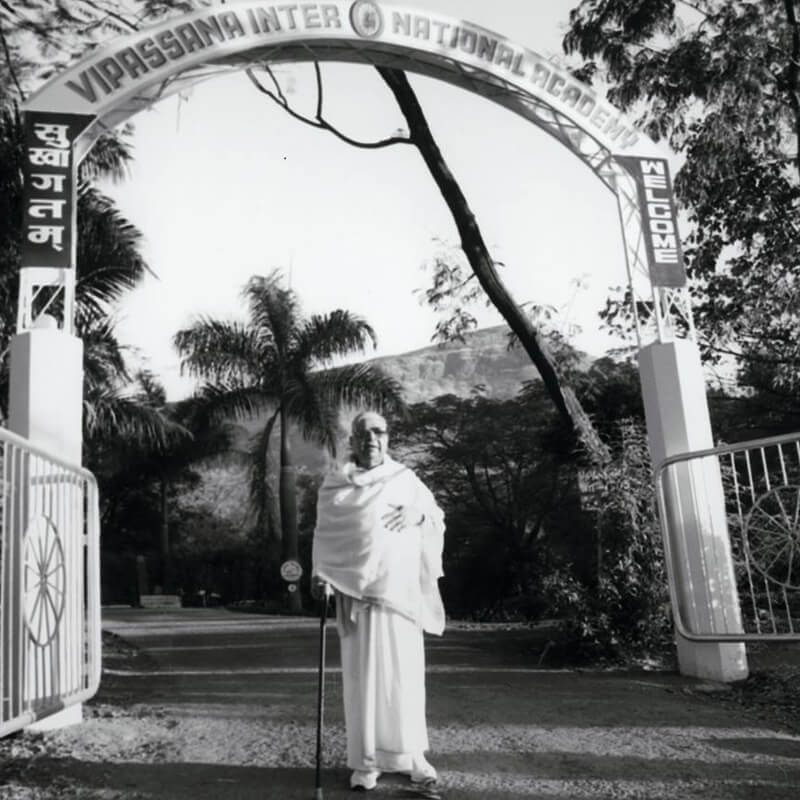Day Fifteen, April 24, New York / Lenox, Mass.
Goenkaji had left New York in the morning but did not reach the Eastover Resort in Lenox, the site of the ten-day Executive meditation course, until late in the evening because of unforeseen delays including traffic jams.
It was a tiring journey. However, Goenkaji had to get ready quickly to give Anapana to the many business leaders and administrators who had joined the course.
Day Sixteen, April 25, Lenox, Mass.
Goenkaji decided to continue his usual custom of giving interviews to students at noon who come and meet him to clarify doubts about their practice.
Day Seventeen, April 26, Lenox, Mass. / Boston / Lenox
Goenkaji and Mataji travelled for three hours to Boston for a public talk. The discourse at the auditorium of Brookline High School was attended by quite a few parents of young meditators who wanted their parents to listen to Goenkaji in person. It was a good opportunity for the parents and other relatives to listen to this simple practical wisdom. Some of the parents who had not taken a course came backstage after the talk to meet Goenkaji.
After the talk, one of the questions was, "I am a Vipassana meditator. How should I attract parents to Vipassana?" Goenkaji answered, "By your own example. Be a good son, be a good daughter. Be a good human being. When your parents see that you are leading a peaceful and happy life they will certainly be attracted to Dhamma. The peace and harmony in you will attract them to Dhamma. You must make sure that you serve your parents. It is your first Dhamma, your first duty."
Goenkaji ate dinner in the vehicle and reached the course site in the Eastover Resort after midnight.
Day Eighteen, April 27,
Lenox, Mass.
Goenkaji gave private interviews to many students in the Eastover course during the afternoon. Old students in the area around the course site also continued to meet him. Some of them travelled for hours just to meet him for a few minutes.
Day Nineteen, April 28,
Lenox, Mass.
Whenever Goenkaji is at a centre or on a course site, he teaches Vipassana himself on the morning of the fourth day of the course. He followed that practice in Eastover too. Throughout the tour, those meditators who have taken many courses but have not earlier participated in a course in which Goenkaji was present have an opportunity to learn Anapana or Vipassana from Goenkaji himself either in a one-day course or a ten-day course.
Day Twenty, April 29, Lenox, Mass.
Rich Balow, a reporter for the Boston Globe, came to interview Goenkaji. Noon interviews with students in the course were followed by a brief meeting with Dhamma workers.
In the evening Goenkaji gave a talk at the Krupalu Yoga Centre which is the largest yoga centre in the U.S. In his talk, he said that the ancient country of India had given two invaluable gifts to the world-yoga and Vipassana. Yoga has been used around the world by people from all religious and socio-cultural backgrounds for improvement of physical health. Vipassana is also being increasingly accepted around the world by people from diverse backgrounds. Both these techniques do not involve any conversion from one organized religion to another organized religion.
When someone asked him about the necessity of doing a full ten-day course, Goenkaji laughed and said that this is the age of instant products and instant spirituality but it needs continuity of practice to work at the deepest levels of mind.
Another person asked about the importance of meditating together. Goenkaji replied that it was important to meditate alone as well as in a group. Both have their advantages. When one takes a serious long course, solitary meditation is essential but it is great happiness to meditate together with other meditators.
Day Twenty-One, April 30, Lenox, Mass.
As soon as Goenkaji returned from the meditation hall after giving private interviews to meditators, there was a call from a reporter from Wellness magazine, Illinois who interviewed him on the phone for almost half an hour. In the late afternoon, a staff photographer from the Boston Globe came over to take Goenkaji and Mataji's photographs as well as photographs of the meditation hall.
The course attracted a fair amount of attention in the media because so many influential businessmen, high level professionals and administrators had come to the ten-day residential course. More than a hundred of them had joined the course and were working very seriously.
A reporter had asked Goenkaji a day earlier whether he changes the format and content of the courses to suit diverse populations such as prison inmates, businesspeople etc. who attend these courses. Goenkaji said that the format and the content were the same for all. "The Buddha's teaching is universal. It is equally applicable to all. Human beings are human beings. They become miserable because of the unwholesome habit pattern of the mind and when they start observing the truth inside, they start coming out of that unwholesome habit pattern."
Day Twenty-Two, May 1, Lenox, Mass.
Dr. Paul Fleischman, a renowned psychiatrist and a Vipassana teacher, is framing guidelines for Vipassana organization to serve those with mental problems. He and his wife Susan sought Goenkaji's guidance on various issues. Later, Goenkaji had a meeting with Thomas Crisman, an attorney specializing in Intellectual Property Rights and a Vipassana teacher, about organizational matters.
Day Twenty-Three, May 2,
Lenox, Mass.
Goenkaji had finished an interview on telephone with "the Straight" in the morning. Many meditators were waiting in the meditation hall for the noon interviews. In the evening, the owner of Eastover resort where the course was organized came to meet Goenkaji with her daughter and one of the managers.
At 9:00 p.m. Goenkaji went to the meditation hall again to answer questions from meditators. The noon interviews are private-others students do not have the opportunity to listen to Goenkaji's answers to various questions but when Goenkaji answers questions at the end of the day, other meditators can stay in the hall and listen. All meditators stayed on in the hall to listen to Goenkaji's answers to various questions. Some sought guidance about how to apply Vipassana in life while others asked questions about the technique.
One meditator, who had done a ten-day course earlier, said, "I have benefited a lot from Vipassana. In the past, I used to sleep until late in the morning. But now I get up early every morning to meditate. Am I getting addicted to Vipassana?" Goenkaji laughed and said, "One calls something addiction when it is harmful. Your regular practice is helpful for you therefore it is not an addiction. Don't worry. Keep on meditating every day and keep on living a happy life. When you find that your practice is becoming weak, join a retreat. You may even join as a part-time student."
Another meditator asked about religious fanaticism and terrorism and whether it was because of certain religious teachings. Goenkaji answered that when some so-called followers of a religion go astray and indulge in inhuman acts, they bring a bad name to their religion.
Day Twenty-Four, May 3, Lenox, Mass.
This was the ninth day of the course. At 9:00 p.m. Goenkaji again gave an open question and answer session in the meditation hall. A meditator asked whether they should try to be aware of sensations while working in the outside world. Goenkaji said, "No. At this stage you meditate morning and evening. You may also maintain awareness of sensations during leisure time but while you are working or doing any activity that requires concentration of mind, give full attention to the task at hand. Otherwise, you will be distracted from your work. During the day, when you realize that some defilement is empowering you, then, for just a few seconds you observe sensations with open eyes understanding that both the sensations and the defilement are impermanent. Soon your mind will become calm and you can continue the task at hand."
A businessman said that in business one has to speak half-truths, and sometimes, outright lies. Goenkaji replied, "It is our greed that makes us believe that one cannot be totally honest in business. If one practises Vipassana, one realizes within that honesty is really the best policy. And as one becomes an honest businessman, the word spreads around and one gets more business. It also helps to improve the overall atmosphere in the business world.
"Once a lawyer joined a course under Sayagyi U Ba Khin. The lawyer liked Vipassana but thought that he had to lie to defend his clients. Sayagyi told him not to lie and instead to accept only such cases where he was convinced that the defendant was innocent. (It is true that the decision of guilt is not made by the lawyer but he can certainly refuse to tell lies knowingly in the court just to defend his client.) The lawyer accepted Sayagyi's advice. Initially he had some difficulties and his business suffered for a brief period. But he was a happier person. Soon, however, the word spread about his honesty and he started getting more cases than he could handle. He even earned the respect of the judges.
Day Twenty-Five, May 4, Lenox, Mass.
Goenkaji taught mettā bhāvanā to the students on the course in the morning. The practice of mettā is the logical conclusion of Vipassana meditation. Mettā is selfless love or compassionate goodwill. It is the development of goodwill toward others. True love doesn't expect anything in return. Goenkaji says, "It is always one way traffic. You just give without expecting anything in return." This goodwill springing from a pure mind creates a peaceful and harmonious atmosphere for the benefit of all.
After mettā, Goenkaji returned to the meditation hall at noon to meet with meditators. In the evening he met with individual meditators at his residence. After the taped video discourse at night, Goenkaji again found time to give a brief talk to the participants of the course. He reminded the participants that because they occupy an important position in society, they have a greater responsibility to be a positive influence on society.
Day Twenty-Six, May 5, Lenox /VMC, Mass. /Flanders
Goenkaji left Eastover Resort in the morning. Just before he left, he was able to meet with a few students from the course.
Students in the course at Dhamma Dharā were in for a pleasant surprise. Though originally Goenkaji was scheduled to go directly to New Jersey, he decided to go to VMC where a ten-day course was in progress. It was the ninth day of the course. Goenkaji answered questions from students for about an hour in the Dhamma Hall. He then had lunch, followed by a meeting with two meditators who wanted to know more about the significance of the Global Pagoda project. Goenkaji said that it is easy for people to come together for sensual entertainment but difficult to come together for true purification of mind. The Global Pagoda will offer an opportunity for people from different religious backgrounds to come together and work towards peace and harmony. Goenkaji reached Flanders Motor Home Park in New Jersey after 10:00 p.m.
Day Twenty-Seven, May 6, Flanders /Rutgers University
Goenkaji travelled to the Livingston Student Centre of Rutgers University to give a speech to an audience that included students and academicians. During the question and answer session, Goenkaji emphasized how important it is for young people to embrace rational, logical, scientific spirituality that is devoid of blind faith and fanaticism.
Day Twenty-Eight, May 7, Flanders /Queens
On May 7, Goenkaji devoted his morning to Indian expatriates and most of his evening to meditators of Chinese origin.
Goenkaji was invited to ITV studio, a TV station dedicated to people of Indian origin in Manhattan for an interview. Ashok Vyas was the host. Goenkaji explained how this invaluable treasure of India was lost to the country and how it is again spreading around the world and giving wonderful results.
After the interview, Goenkaji travelled to Queens, NY near the New York Vihara where his motor home was parked. In the evening Goenkaji went to the Dhamma House in Queens where regular group sittings and one-day courses are held. A number of Chinese Vipassana students live nearby. Goenkaji arrived at the end of the group sitting and answered questions from meditators.
Day Twenty-Nine, May 8,
Queens / Manhattan /Flanders
The Sangha of bhikkhus is seen by some as a sectarian entity. A practitioner of Vipassana knows that he or she has received this invaluable jewel because it was preserved by a chain of bhikkhu teachers through the millennia in its pristine purity without giving it a sectarian color. Such a Sangha inspires gratitude and confidence. In the Buddha's teaching, saddhā means faith or confidence-confidence that one develops in the teaching of the Buddha from one's own experiential wisdom.
Goenkaji served food to the Bhikkhu Sangha headed by Ven. Piyatissa in the New York Vihara in Queens. Many meditators from diverse backgrounds joined the Sangha-dāna. People from India, Sri Lanka, Myanmar, Cambodia, China, Taiwan, Hong Kong, Bangladesh, Thailand, Israel, North America and European countries took the opportunity to serve the bhikkhus. Later on, the bhikkhus were given their requisites in donation. Finally, Goenkaji gave an inspiring address. He recounted how the silent file of bhikkhus with their eyes downcast going out for the alms in the morning in his motherland, Myanmar, always gives him so much joy.
In the evening he gave a talk at the Interfaith Centre in Manhattan. This centre has worked for many decades to bring together people of different faiths. Reverend Dean Morton introduced Goenkaji and requested him to give a talk on Dharma and Business. Goenkaji explained how success and failure, profit and loss are part of business and how they cause misery if one has not learned to maintain equanimity. He also explained how Vipassana transcends sectarian barriers.
After the talk Goenkaji was interviewed by the press and then returned to Flanders around 11:00 p.m.
Day Thirty, May 9, Flanders, NJ / Pennsylvania
Zellerbach Theatre in the Annenberg Centre at University of Pennsylvania hosted Goenkaji's talk in the evening.
"Vipassana is a simple, practical way to achieve real peace of mind and to lead a happy, useful life. Vipassana enables us to experience peace and harmony: it purifies the mind, freeing it from suffering and the deep-seated causes of suffering. The practice leads step-by-step to the highest spiritual goal of full liberation from all mental defilements.
"Usually when one is faced with difficult situations, for example, when one is angry, usually one is not even aware that one is angry and continues to burn. Even when one realizes that one is angry, one usually tries to deal with it by turning one's attention to some other thing. One may turn to intoxicants or sensual entertainment. Someone may do better and recite something or pray or just do something simple such as counting numbers or get involved in some other activity. All this is running away from the problem. We must learn to face the problem rather than running away from it.
"But how to face anger? It has no shape or form. A Vipassana meditator finds that every defilement that arises in the mind arises with sensations on the body. When anger arises, there is so much burning inside. He learns to observe this burning sensations or any other sensations that one feels at that time. He doesn't dwell on the cause of anger. He just accepts that there is anger and understands with experiential wisdom that the sensation is impermanent and so also is the anger.
"Thus one has learned to face the problem. And as we keep on observing sensations with an equanimous mind, defilements start getting eradicated from the depth of the mind."
Day Thirty-One, May 10, Coatsville /Unionville, PA
There is a strong team of meditators in this area, including a large expatriate Cambodian community, engaged in Vipassana activities. There was a one-day course at the Rivero Hall in Lincoln University.
Goenkaji gave a brief speech at the one-day course, "One of the most important reasons why Vipassana was lost in the country of its origin was that people started adding something to it. The Buddha's teaching is paripuṇṇaṃ-it is complete, there is no need to add anything to it. It is parisuddhaṃ-it is totally pure, there is no need to remove anything from it.
"At the Vipassana centers, we must take care that we teach nothing but sīla (morality), samādhi (concentration of mind) and paññā (purification of mind). If we start any other activity that seems quite harmless, soon that particular activity will become very important and Vipassana will be relegated to a secondary position. Now that the Buddha's teaching is arising again, let us keep it in its pristine purity so that it helps more and more people around the world for centuries to come."
In the evening Goenkaji gave a talk at the Unionville High School Auditorium. Someone asked Goenkaji what his comments were on love at first sight. Goenkaji laughed and said, "Why only at first sight? There should be love at every sight. But it should be pure love. Pure love is full of compassion. It is totally free of lust."
Day Thirty-Two, May 11, Coatsville PA / Ashland, VA
Many meditators had expressed the desire to join the group of vehicles travelling with Goenkaji and Mataji. The tour organizers carefully selected a few based on their utility on the tour. Some are official tour members and some are allowed to join as additional independent vehicles to support the group. They are assigned various duties such as kitchen, laundry, driving, vehicle maintenance, recording Goenkaji's public talks and talks to meditators, distributing literature, logistics of various events, coordinating with local organizers etc. This group of seven vehicles forms the Dhamma Caravan that will take Goenkaji around North America to spread the munificent message of Dhamma. All have volunteered their time for weeks and some for the whole tour to look after Goenkaji and to support his Dhamma Messenger activity in various capacities.
Goenkaji agreed to give a live telephone interview on a Houston radio talk show called "The Open Forum" immediately after his arrival at the campsite. He gave the interview and answered questions from the radio show audience from about 6:30 to 7:00 p.m.
Day Thirty One, May 12, Ashland, VA / Charlotte, NC
The Dhamma Caravan had to cover more than three hundred miles today to reach Charlotte. As the vehicles sped on the Interstate 85 South, Goenkaji used the time to catch up on his reading and writing.
Some of the caravan members started getting a little tired of the long journey. Goenkaji sat absorbed in his work. Last week when he was returning from a public talk and he was still on the road even after 11:00 p.m., he could be heard chanting:
Chala sādhaka chalatā rahe, desh aur pardesh;
Dharma cārikā se miteṃ sabake manake kleśa.
(Keep travelling, O meditator, in your country and abroad,
May this Dhamma tour eradicate everyone's mental impurities.)
Day Thirty-Four, May 13, Charlotte, NC
Goenkaji's arrival rejuvenates Vipassana activities in every area that he visits. Wherever he goes, the meditators in that area come together, get to know each other better and start meditating together. They become inspired to put in more effort on the path of Dhamma. As Emperor Ashoka wrote in one of his edicts, "To do good is difficult. We have to do good in many different ways." Serving in various capacities complements our practice of meditation.
And so it happened in Charlotte. One long-lost meditator was a physician who had taken a ten-day course in 1971. He was able to meet Goenkaji after the public talk in Charlotte and told him that the Vipassana course he took so many years ago had had a life-transforming effect on him. There was another woman who had taken a course in 1973 and brought her fifteen-year-old son to listen to Goenkaji's discourse.
The meditators in Charlotte found it very encouraging that there were so many meditators in their area. They are now planning more non-centre courses there. One meditator brought his son to Goenkaji's talk. He had been trying to convince his son to give Vipassana a try for a long time but had not succeeded. After the talk, his son said that he would take a Vipassana course.
(to be continued)






